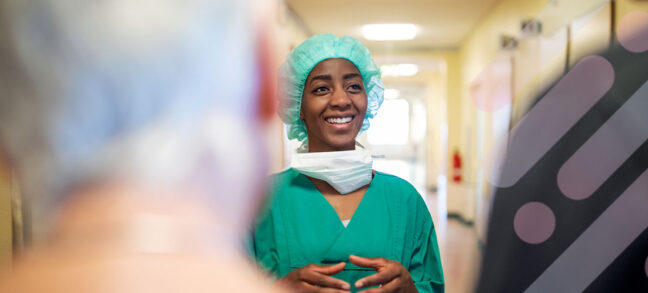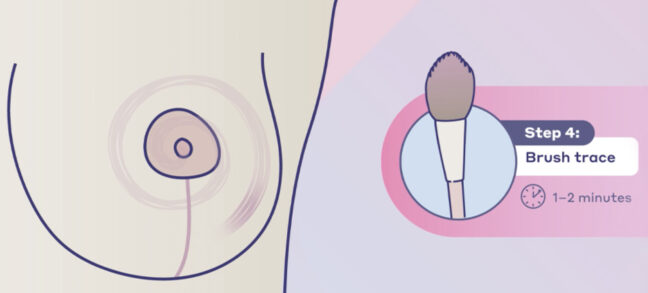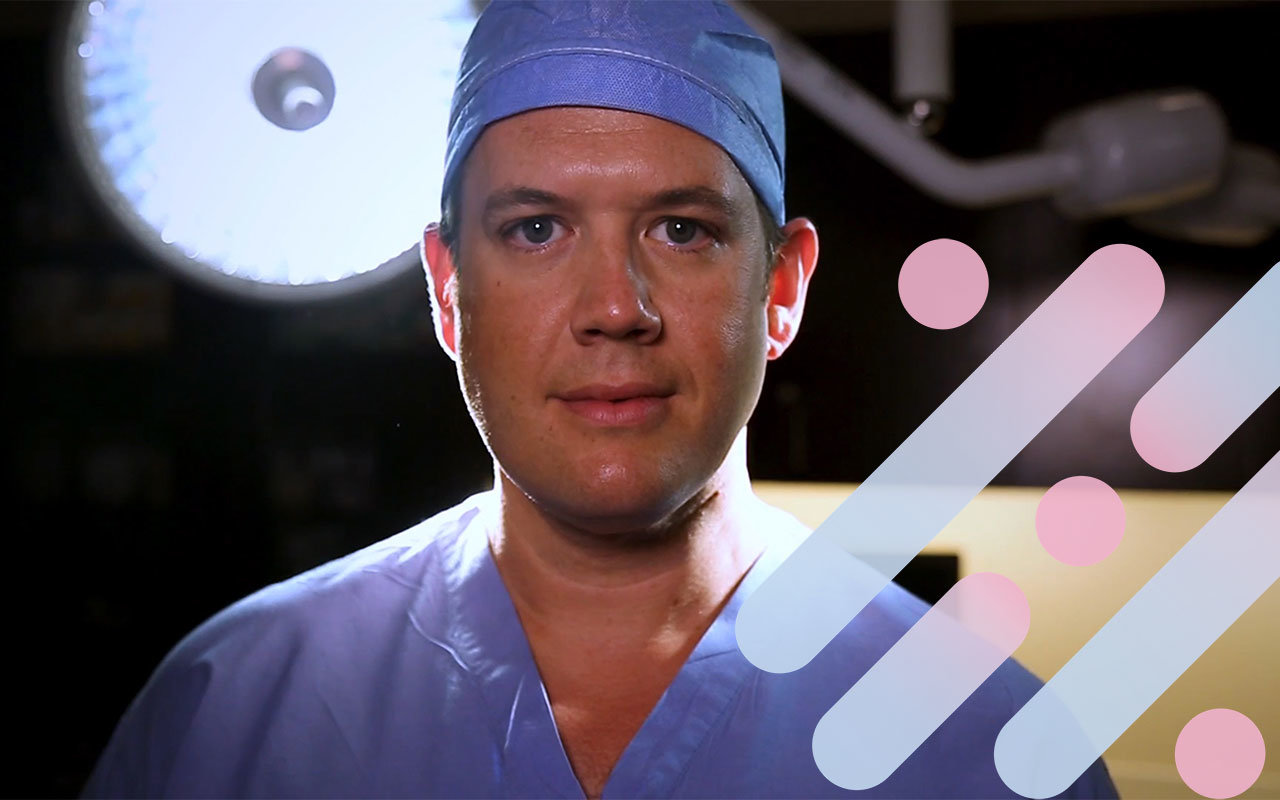An Interview with Warren Ellsworth, MD
When Dr. Warren Ellsworth was growing up, his mother was diagnosed with breast cancer and had a double mastectomy in the late 1970s. Just 33 years old at the time of her diagnosis, she never seriously considered breast reconstruction. At the time, options were limited, and most women were never offered reconstruction1.
Even after his mom’s recovery, the family’s cancer ordeal wasn’t over. Ellsworth’s father was later diagnosed with lymphoma. After his death at age 42, Ellsworth’s mom became the family breadwinner. She threw her energy into raising Ellsworth and his three siblings. She rarely spoke of her breast cancer or mastectomy.
“She never dated, never really pursued anything except taking care of the family. She was private. I wouldn’t say embarrassed, but certainly it was hard for her,” he said.
Years later, Ellsworth was a medical student considering specializing in plastic surgery. He arranged a consultation for his mother with his mentor, a highly respected plastic surgeon. “She underwent a breast reconstruction with him, and it was just a metamorphosis. Her confidence improved, she began dating again, got remarried, and was able to have the life she truly deserves,” said Ellsworth.
Inspired by his mother’s experience, Ellsworth, a plastic and reconstructive surgeon in Houston, Texas, is dedicated to ensuring women receive the best possible outcomes after mastectomy and breast reconstruction. In addition to offering women a wide range of breast reconstruction options, he also incorporates Resensation into his surgical practice. Through Resensation, women have the potential to have sensation returned to their reconstructed breasts. Surgeons who perform Resensation use a nerve allograft (donated nerve) to reconnect nerves in the chest with those in the reconstructed breast.
“I saw the power breast reconstruction had in my mother’s life and in the lives of my family, and I felt offering that to other patients and families would be a great way to contribute,” he said. “If I can take it a step further and offer reconstruction that not only offers aesthetic improvements, but also the potential to restore sensation, that’s even better. I am blessed to help many amazing patients, and my goal is to continue innovating so that we can give them the best and most comprehensive reconstruction options possible.”
Dr. Ellsworth shared how he uses Resensation in his practice and what motivates him to provide new breast reconstruction options to his patients.
As a plastic surgeon who specializes in breast reconstruction, what challenges did you face prior to Resensation in ensuring women got the best possible outcomes?
My surgical practice coordinates with many breast surgeons in the Houston area to provide breast reconstruction for women undergoing breast cancer treatment and mastectomy. What we’ve found over the years is that we can do a beautiful job rebuilding a patient’s breast, using either implants or her own tissue, but what we couldn’t rebuild is sensation.
In other words, patients can have a nice form and shape after breast reconstruction, but when they hug someone, they can’t really feel it. This lack of sensation interferes with day-to-day activities like putting on clothes and can feel very unnatural for women. The reason for this is that during a mastectomy, the breast tissue is removed, severing the nerves that provide feeling to the breast, skin and nipple. When nerves are severed, nerve signals are disrupted. This usually results in numbness and loss of feeling in the breast area. This is an issue that’s plagued patients and doctors in my field, and we’ve been searching for a solution.
How are you currently using Resensation in your practice?
Sometimes I’m able to hook the nerves up directly. However, most of the time, there’s a larger gap than nerve tissue available. That’s where Axogen’s Resensation technique comes into play. The Axogen allograft nerve tissue can be used to bridge the gap between the nerves in the breast and the nerves in the chest wall. With Resensation, we are now able to give the majority of our patients undergoing breast reconstruction the possibility of restoring feeling to their breasts.

What have been the outcomes for your patients who have undergone Resensation?
We performed the Resensation technique on our first set of patients a few months ago, so the outcomes are early. Nerves grow slowly, at about 1 millimeter per day2, which means some patients are just starting to experience some sensation in their chest.
We will continue to study the outcomes of breast neurotization with Axogen’s Sensation-NOW™ (Neurotization Outcomes for Women) study. This is exciting for me as a doctor, but even more so for my patients. I go through consults every week with women who have been newly diagnosed with breast cancer, and they are thrilled that they have the option to potentially restore sensation after a mastectomy. We look forward to following the results using the Resensation technique, so that we can make the future of breast reconstruction even brighter than it is today.
What are the physical and psychological impacts of a woman losing sensation after a mastectomy?
Imagine waking up from surgery, and your entire chest feels numb – almost like when you go the dentist. The numbness can make you feel swollen or like your body isn’t completely yours. For many women, this sudden loss of sensation may be unexpected and stressful. They may have trouble the first time they put on clothes because they can’t feel their chest.
The effects of losing sensation go beyond that, though. One of the biggest psychological impacts of sensory loss is on a patient’s sexuality and intimacy with her partner. Every week, I see a patient who is concerned about the outcomes of their mastectomy and reconstruction with regards to the sensuality and sexuality surrounding sensation of the breast. The impact of lack of sensation is real, and it can affect every mastectomy patient.
Breast reconstruction has traditionally focused on appearance. How is breast neurotization with Resensation changing that paradigm, and why is it important?
Breast reconstruction over the last 50 years has been revolutionized by many techniques. We’ve gone from using first-generation breast implants to much more advanced implants that give a better look. Microsurgery has given us the opportunity to provide patients with autologous breast reconstruction using their own tissue, resulting in a natural-looking breast that can potentially last a lifetime3. With advances like nipple-sparing mastectomies and autologous reconstruction, we’ve really refined cosmetic outcomes.
The aesthetic revolution in breast reconstruction has been significant. The part that’s been lacking is sensation. With Resensation and the Sensation-NOW study, we have the opportunity to scientifically study the best way to make sensation work. While we don’t know the exact degree or type of sensation that can be returned to the breasts, if we can give a patient the ability to feel a hug from their child or spouse, that’s a very big deal. And if we can give patients the potential to have more sensation return over time, it may be the next level in breast reconstruction.
What are some factors women should consider when choosing a plastic reconstructive surgeon?
Women have several factors to consider. Breast cancer treatment requires a cohesive team, including both a breast surgeon and plastic surgeon, who need to be consistently communicating and collaborating. Women should also consider a board-certified plastic surgeon, as these surgeons have gone through rigorous training in their specialty.
I think women should also consider going to a plastic surgeon who offers more than one type of reconstruction, including autologous and implant reconstruction. It is not uncommon for me to have patients travel from all over because they’ve only been offered one technique, often implant breast reconstruction, but are interested in finding out about other options.
Finally, a factor that’s important for all types of surgery is that the patient finds an office and surgeon that they mesh well with. I think liking and trusting the surgeon you will be working with is crucial.
Do you find there is there a type of reconstruction that’s generally best for women, or does it vary on a case-by-case basis?
There are certainly surgeons out there who mostly do one type of breast reconstruction, but I don’t follow that model. At my practice, I offer all types of breast reconstruction, as the right procedure often varies for each patient. One patient may want to have a lumpectomy and do a breast reduction at the same time, while for other women, implants after a mastectomy are the best fit for their life circumstances.
Then there are patients who really like the idea of using their own tissue and choose to undergo a DIEP flap or other free flap surgery. While free flap reconstruction is very popular among my patients, I inform them about all their options, and we work together to match the correct procedure to each patient.
What motivates you to provide patients with cutting-edge breast reconstruction options like Resensation?
I’m blessed to have many amazing patients that have come into the office and are just so happy with their reconstruction, their life and that their battle is over. When women have autologous reconstructions, we can often improve the aesthetic of the area that we take the tissue from. It’s not uncommon for women to consider it the silver lining of breast cancer.
Some women have had implants for a long time, and they either have problems with the implants or decide they aren’t right for them. Then we have the opportunity to offer them autologous reconstruction. These are the patients that are often very, very grateful to have something much more natural.
Many of the most powerful comments come from women who have delayed reconstruction, which means they have lived without a breast for some time. Some of them are overjoyed to see what we can give them.
When we rebuild the breast, we can still honor their battle with cancer, while at the same time allowing them to protect their femininity and their confidence. From an emotional standpoint, I go through many consults every week with patients who are newly diagnosed, and it’s remarkable to see the look on their face when we explain to them that there’s a possibility of not only using their own tissue to rebuild their breasts, but also the possibility of restoring sensation. It’s been a really remarkable experience for me and my whole clinical team here in Houston.
About Warren Ellsworth, MD
Dr. Warren Ellsworth is a board-certified plastic surgeon, diplomat of the American Board of Plastic Surgery and a fellow of the American College of Surgeons. His academic background includes a bachelor’s degree from University of Virginia, advanced studies at the University of Oxford, and a medical degree from Baylor College of Medicine.
Ellsworth trained at the world-renowned Texas Medical Center, where he gained extensive experience in cutting-edge techniques in breast reconstruction, microsurgery and cosmetic surgery. Ellsworth now has his own surgical practice, Ellsworth Plastic Surgery, in Houston and is currently medical director of plastic & reconstructive surgery at Houston Methodist West Hospital. Ellsworth also serves as associate professor of plastic surgery at Weill Cornell Medical College and adjunct associate professor of plastic surgery at Baylor College of Medicine.
For more information or to contact Dr. Ellsworth, visit www.ellsworthplasticsurgery.com
________________________
1https://www.ncbi.nlm.nih.gov/pmc/articles/PMC2884724/
2http://nerve.wustl.edu/NerveInjury.pdf
3https://www.breastcancer.org/treatment/surgery/reconstruction/types/autologous
Dr. Ellsworth did not receive compensation from Axogen Corporation for his time in connection with this interview.
Resensation Articles

How does mastectomy impact the nerves in the breast?
One sometimes overlooked aspect of mastectomy is its impact on nerves. Read what happens to nerves during mastectomy and explore…
Read More
What happens during implant breast reconstruction with Resensation®?
By repairing sensory nerves, Resensation® enables you to potentially regain sensation to your chest. Read how this procedure works during…
Read More
how resensation® helped Leanna feel secure in her family’s future
With Resensation®, Leanna can be there to watch her kids grow up—without losing the feeling of being whole.
Read More
post-surgery sensory retraining: instructions and video guide
Sensory retraining is a series of exercises designed to help you reconnect with your body after breast reconstruction with Resensation®.
Read More